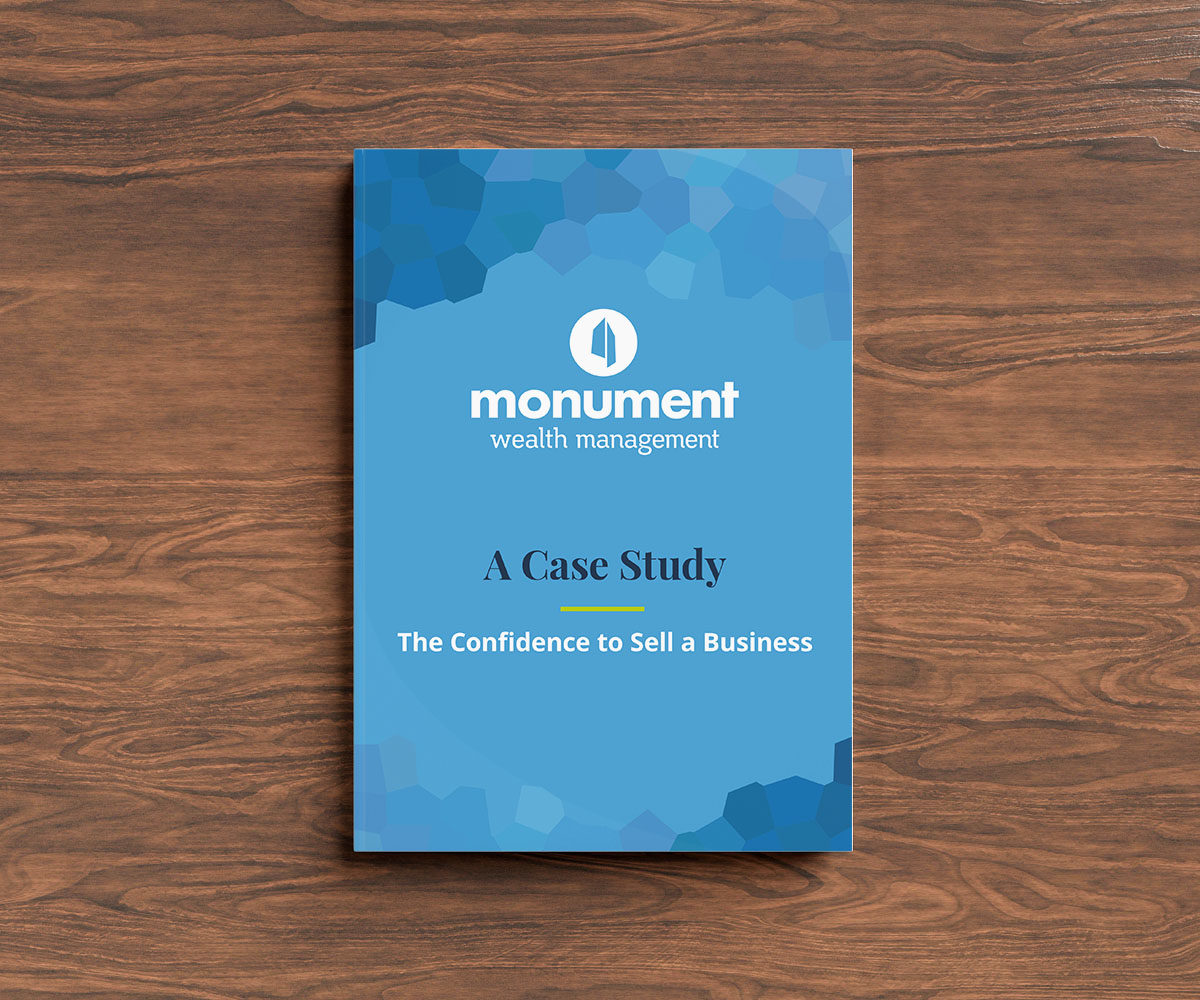Monument Wealth Management Articles
Preparing to Sell Your Business: 6 Actions to Take Now

Share on your favorite platform, or by email
You’re a pro and have been in the game for a while, you know the competitors and how to win better than most – and you’ve had a string of winning seasons operating your business. As a business owner, you have determined it is time to exit and position yourself for the next stage of your life. But just like in baseball, your successful business exit hinges on more than just swinging for the fences. It is about strategic planning, adapting to the inevitable curveballs, and knowing when to “rally” and unlock the wealth you have created. It has been reported that 80-90% of business owners have their financial wealth locked up in their companies. It’s not until they execute on their liquidity event—a full or partial sale of their businesses—that they unlock their wealth to fund the next phase of their life.
Most business owners do not realize that their personal financial planning needs to begin well in advance of selling their business. This is the point in their lives when strategies can be implemented that have the greatest impact on tax management and legacy planning.
It is before, not after, a business is sold when much of the real financial work begins.
Indeed, following a plan that allows for a seamless transition from one phase of life to the next is not as easy as it may sound.
If you are thinking this may be your last season and considering a liquidity event, grab your glove and explore the 6 Actions to take before your business sale.
1 – Craft a “No Sale” Contingency Plan: Game Delay or Rainout
In the game of entrepreneurship sometimes the market throws a curveball, and your business valuation is less than what you had expected. Instead of striking out, have a contingency plan in place. It’s good to hope for the best but be prepared to adjust your expectations downward if the valuation of your business comes in lower than expected.
Is it possible to remain with the business a few years longer to maximize cash flow and increase the value before selling? With the help of an investment banker, create a plan that outlines the steps and timeline that will impact the market price of your company and provide insight on achieving a higher valuation. On the other hand, although a lower valuation was not what you expected, it may be more than enough to fund all the goals for the remainder of your life.
A wealth advisor who specializes in “cash flow” planning will be able to run a series of financial scenarios that will show the probability of success for every goal and objective you have. Whether it’s adjusting your game plan or exploring alternative avenues, preparation is the key to staying in the game.
2 – Strategize for Potential Tax Increases: The Umpire makes the call
Ah, taxes—the umpire’s call that can change the game. The 2017 Tax Cuts and Jobs Act (TCJA) is set to sunset on 12/31/2025. What actually happens is anyone’s guess and may depend on which political party controls the White House and Congress.
However, there are specific tax considerations of the TCJA that may make it more advantageous for a business owner to exit before the TCJA sunsets. With the “sunsetting,” individual tax rates are scheduled to increase. The “big one” is the $13.6 million lifetime estate & gift tax exemption ($27.2 million for married couples) that is scheduled to reset to ~$6 million (~$12 million for married couples) in 2026 — that’s a significant difference!
If your business sale is expected to be ~$12M or more, it may be strategic for you to explore selling before the TCJA Sunsets and update your estate planning to include legacy gifts to family while the exemption amount is elevated. This should be a key discussion point with your advisory team — a well-crafted estate plan and tax strategy can save you from getting tagged out at home plate.
3 – Draft Your Dream Team of Advisors
Every championship team has a few key players that impact the probability of winning. It is vital to have advisors who can shepherd you through the rest of your life both before and after a business sale is done. Build a team of advisors comprising a deal attorney, investment banker, CPA, trust & estate attorney, and a wealth advisor.
Certain team members will have a more lasting impact over time than others. While transactional advisors such as a deal attorney and investment banker are essential to winning the game, they are there to do one thing: get maximum value and terms for your business. After that, their job is essentially done.
Business owners also need a wealth advisor who can put a plan in place that will have a high likelihood of helping them achieve their lifetime goals for the capital from a business sale. Far too many business owners have become exceedingly wealthy after a sale, but do not have a permanent wealth advisor in place to help them navigate the next phase of their lives.
4 – Managing Your Cash Flow: Rounding Third and Heading to Home
Establish a cash flow plan that focuses on your goals as “liabilities” that must be funded. The key transition business owners must make after a business exit is to go from having a steady stream of income to making one lump sum last for a generation—and hopefully beyond.
This plan should map out all post-exit lifestyle goals and day-to-day concerns. Think of all goals as liabilities. For example, “day-to-day liabilities” would include the cost of basic necessities such as food, clothes, and health care. “Lifestyle liabilities” would include discretionary expenses such as travel, entertainment, and dining, while “legacy liabilities” would encompass inheritances, endowments and philanthropy.
These liabilities should be adjusted periodically to reflect market conditions or other variables. It’s important to chart out each goal and corresponding liability before a liquidity event. Information is power and if you know the pitcher is going to throw a fast-ball – you have the best chance of hitting a dinger!
5 – Select the Team Captain for Your Deal Team
Exit planning is a team sport, so make sure there is a designated “first among equals” point person to act as the Team Captain of your advisory team. This person should be part of the process from the beginning, taking the lead from the outset and being plugged in with the investment banker, deal attorney, CPA and trust & estate attorney, and wealth advisor as you move through the long season ahead.
In most cases, the wealth advisor should be the Team Captain since he or she is typically very aware of the client’s broad, long-term interests. As previously noted, investment bankers and deal attorneys fill temporary roles on the team. The CPA and estate attorney are more permanent fixtures and fill special roles, providing services largely on a seasonal basis or services for intergenerational planning.
This leaves the wealth advisor as the “all-weather” player, providing the client with continuity and consistency before and after the exit event is completed.
6 – Distribute Equity Gifts Like a Champion
Once a business is in play following a formal valuation process and/or signing of a letter of intent, the value of its equity may increase. Given the current $13.6 million lifetime estate & gift tax exemption ($27.2 million for married couples) cap for gifting to family members, and that those exclusions will be sunsetting in 2025, the sooner there is a plan for gifts, the better. Good planning allows for tremendous intergenerational capital preservation down the line via tax savings.
Selling your business may mean that you won the game, but it does not mean the season is over. After the business exit, the game changes to reflect a diverse set of financial planning and management decisions that are specific to each person and family.
Post Game Box Score
Remember that selling your business is not the final inning—it’s just the seventh inning stretch. With the right players, playbook, and a dash of financial finesse, you can navigate the next phase of life’s complexities like a pro. After all, it is not just about winning the game—it’s about building a dynasty that lasts for generations.

Learn How we Helped Chuck & Kelly Plan for Their Business Sale
Ready to Make a Plan for Your Business Sale Wealth?
IMPORTANT DISCLOSURE INFORMATION
Please remember that past performance is no guarantee of future results. Different types of investments involve varying degrees of risk, and there can be no assurance that the future performance of any specific investment, investment strategy, or product (including the investments and/or investment strategies recommended or undertaken by Monument Capital Management, LLC [“Monument”]), or any non-investment related content, made reference to directly or indirectly in this blog will be profitable, equal any corresponding indicated historical performance level(s), be suitable for your portfolio or individual situation, or prove successful. Due to various factors, including changing market conditions and/or applicable laws, the content may no longer be reflective of current opinions or positions. Moreover, you should not assume that any discussion or information contained in this blog serves as the receipt of, or as a substitute for, personalized investment advice from Monument. To the extent that a reader has any questions regarding the applicability of any specific issue discussed above to his/her individual situation, he/she is encouraged to consult with the professional advisor of his/her choosing. No amount of prior experience or success should be construed that a certain level of results or satisfaction will be achieved if Monument is engaged, or continues to be engaged, to provide investment advisory services. Monument is neither a law firm nor a certified public accounting firm and no portion of the blog content should be construed as legal or accounting advice.
A copy of Monument’s current written disclosure Brochure discussing our advisory services and fees is available for review upon request or at www.monumentwealthmanagement.com/disclosures. Please Note: Monument does not make any representations or warranties as to the accuracy, timeliness, suitability, completeness, or relevance of any information prepared by any unaffiliated third party, whether linked to Monument’s website or blog or incorporated herein, and takes no responsibility for any such content. All such information is provided solely for convenience purposes only and all users thereof should be guided accordingly.
Historical performance results for investment indices, benchmarks, and/or categories have been provided for general informational/comparison purposes only, and generally do not reflect the deduction of transaction and/or custodial charges, the deduction of an investment management fee, nor the impact of taxes, the incurrence of which would have the effect of decreasing historical performance results. It should not be assumed that your Monument account holdings correspond directly to any comparative indices or categories. Please Also Note: (1) performance results do not reflect the impact of taxes; (2) comparative benchmarks/indices may be more or less volatile than your Monument accounts; and, (3) a description of each comparative benchmark/index is available upon request.
Please Remember: If you are a Monument client, please contact Monument, in writing, if there are any changes in your personal/financial situation or investment objectives for the purpose of reviewing/evaluating/revising our previous recommendations and/or services, or if you would like to impose, add, or to modify any reasonable restrictions to our investment advisory services. Unless, and until, you notify us, in writing, to the contrary, we shall continue to provide services as we do currently. Please Also Remember to advise us if you have not been receiving account statements (at least quarterly) from the account custodian.
